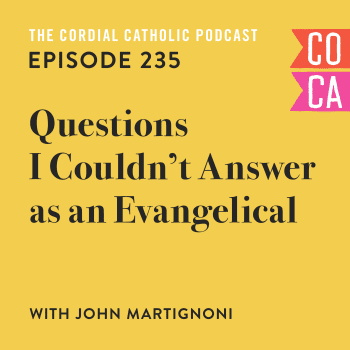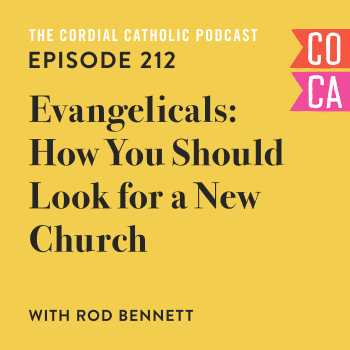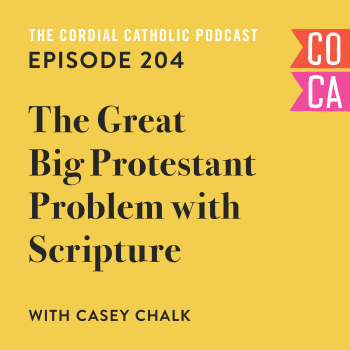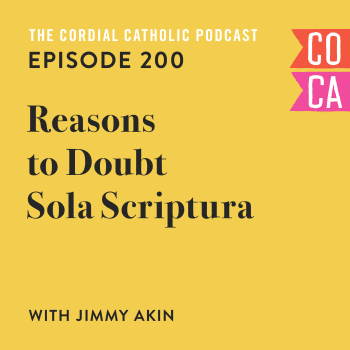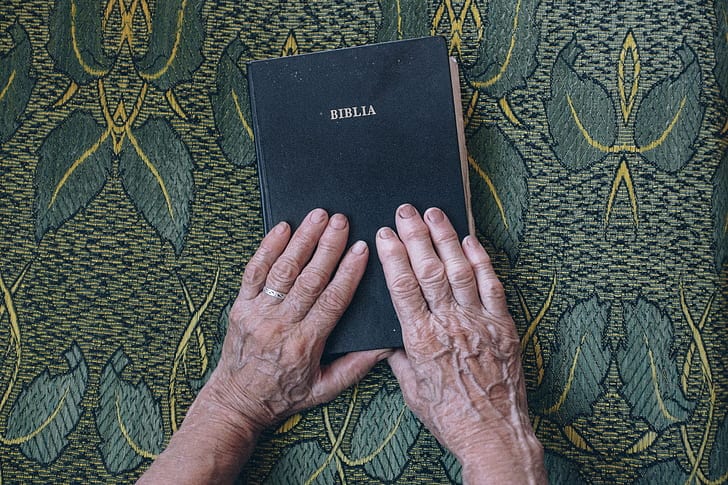
When I became a Christian at the age of fifteen one of the first things I did was bum a ride, from my Mom, to that local Christian bookstore.
Those were a thing back then.
I needed to buy a Bible. I had no idea where to start.
Half an hour later I walked out with an Extreme Teen Bible, New King James Version, in black bonded leather.
I had no idea back then that was I was participating in was a tradition. It was the tradition of a Bible: a collection of books and letters, bound between two covers, which was being handed on to me by the clerk at the store.
As a new Christian I knew that we considered the books of the Bible to be inspired and infallible but I never thought deeply about how that came to be. When that clerk handed me my Bible I didn’t stop to say, for example, “How do you know these are the books that belong in here?”
“Who decided on the Table of Contents?”
It didn’t cross my mind until more than a decade later when I began investigating church history. After all, somebody or some body had to decide which books of the Bible belonged and which didn’t. The Bible, completely intact, didn’t simply fall from the sky. It’s a collection of books.
So who, I asked, was the collector?
Who decided which letters of Paul were authentic and belonged? Who decided which Gospels were genuine and told the real story of Jesus’ life, death, and resurrection? Which books of the Old Testament told the true story of our salvation history?
The answer to the question, from a perspective of history, is surprisingly straight forward. We have documents from the Early Church, from the first few centuries of church history, which paint a very clear picture. Church councils met and decided on which books they considered inspired by God and part of the canon based on what was handed down to them by the very first Christians, the apostles of Christ, who had even written some of the books that were included.
For other books, where it may not be so obvious, they dialogued and prayed and decided—guided, they believed, by the Holy Spirit into all truth.
But I learned too, as I began to dig into the history of my faith, that my Protestant Bible was different than what was used by Catholics (and Orthodox Christians, too).
My Bible was smaller, it contained less books than its Catholic counterpart.
Catholic Bibles were bigger.
It came as an absolute shock and I was determined to figure out what happened and how—seriously, how?!—could there be different versions of the Bible.
Recently, on the podcast, I was fortunate to sit down for a chat with Gary Michuta. Gary has literally written the book on the Bible and has some incredible insights into how the canon of Scripture—what got in and what was left out—came to be and, most importantly, why our Catholic Bibles were bigger.
It happened, says Michuta, during the Reformation and began with none other than Martin Luther himself.
Luther, pointing out what he saw as errors in Church teaching, began to break away from the authority and the leadership of what he saw as the corrupt Catholic Church. He had a point, many good points, which he’s said to have nailed to the door of a church in Wittenburg but when his new interpretations of Catholic theology began to be pressed, and challenged, he doubled down.
And as Luther began to question ideas long held by Christians like purgatory and the authority of bishops he began, also, to dismantle other ideas long held to be true like the canon of the Bible itself.
Spurred on by points of theology—purgatory, for example—which didn’t line up with his own understanding Luther began to question a selection of books in the Old Testament which seemed to support it. These books, called now the deuterocanonical books or the Apocrypha, take place in the time between the “last” of the prophets and the timeline of Jesus. A time which, as a Protestant Christian reading my Protestant Bible, we used to call the “Great Silence.”
Turns out God wasn’t so silent after all.
In questioning these books Luther appealed to ancient Christians like St. Jerome.
Jerome, the great translator of the Latin Bible, also questioned the validity of these books but, says Michuta, based on a fallacy. The Deuterocanonical books, written in Greek not Hebrew, seemed to be less credible to Jerome. They weren’t in Hebrew, after all, so they couldn’t be trusted as original to the Old Testament canon.
In fact, when Jerome compared the Greek Septuagint to the Hebrew Masoretic texts, he found what he perceived to be inconsistencies. Not only were some books included in the Septuagint which weren’t in the Masoretic canon but some books in the Septuagint collection were longer, which more and different parts.
But Jerome was wrong.
Even though Jerome was highly critical of these books, as he translated them, the Church was unrelenting in including these books in the Bible. It didn’t matter that some were in Greek and some were in Hebrew the Church was steadfast in what it identified as Scripture. The Church continued to use the Bible it had authoritatively decided upon—which included the deuterocanonical books; the Bible that the Church and all Christians in the West used in its liturgies, its celebrations, its worship services and Bible studies up until the Reformation.
Of course the Catholic Church continues to use this bigger Bible and in the East, where Bibles were always in Greek, the issue of languages raised by Jerome was irrelevant—as was the Reformation.
As we’ll see, Jerome was wrong. His Hebrew thesis, as noble as it may have been, was misguided and the Church knew it.
And, says Michuta, it isn’t even terribly difficult to prove his mistake.
“If you can discover what collection of Scriptures Jesus and the apostles handed down,” says Michuta, “then you have the inspired Old Testament Canon.”
After all, the writers of the New Testament would’ve had to write their messages down. These books of the New Testament, of course, were in written Greek but we can now do something, centuries later, that Jerome and even Luther couldn’t do: we can systematically compare what translation and what version these authors used when quoting the Old Testament.
Jerome questioned the deuterocanonical books because they were in Greek but did Jesus and the apostles?
As it turns out, not so much. The New Testament writers, says Michuta, overwhelmingly preferred the Greek Septuagint text. It was, he says, “their go to text.”
If the inspired writers of the New Testament saw fit to make use of the Greek translation of the Old Testament, a translation which included the deuterocanonical books, then why would Jerome know better?
But, of course, Jerome probably couldn’t have known. Not without an intensive textual comparison, something which is easily done now.
In fact, Michuta goes even further to say that without the deuterocanonical books some portions of the New Testament don’t make sense. These portions, like the nod to a Jew being martyred for believing in the resurrection, make little sense without the context of the 1 and 2 Maccabees, included in the Greek Old Testament but missing from the Hebrew version.
Not only were the writers of the New Testament quoting from the Greek canon which included these books but they were, without dispute, referring to them as well. To the larger Greek Old Testament canon. To the books that make up our bigger Catholic Bible.
In the end, it comes down to a risk that every Christian must take. A wager, of sorts.
Do we trust that the Bible handed down to Christians since it was collected together in the 4th century? Or do we trust Luther, based upon St. Jerome, who threw into question the Greek books of the Old Testament canon?
If we trust Luther, and by extension, Jerome, we make the two a kind of “super Pope,” says Michuta. We give one solitary Bible scholar, a saint but not infallible, the authority to dictate which books belong and which ones don’t. In contrast, we must remember, to what the Church had handed down for a thousand years.
And, for me, I’m willing to bet on the side of history.
To listen to my full interview with Gary Michuta click here, or listen below.



